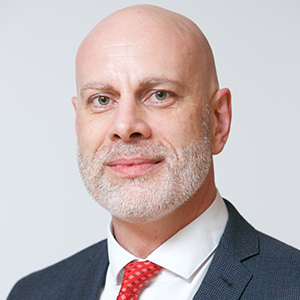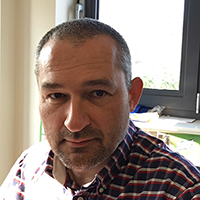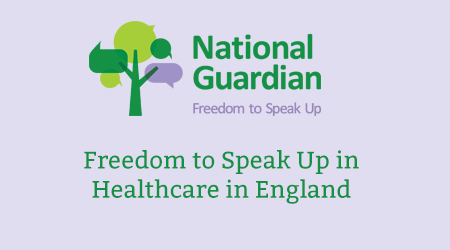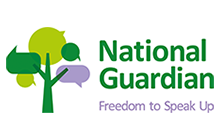About the Freedom to Speak Up in Healthcare in England programme
This training is for everyone wherever they work in healthcare and explains in a clear and consistent way what speaking up is and its importance in creating an environment in which people are supported to deliver their best. It will help you understand the vital role you can play and the support available to encourage a healthy speaking up culture for the benefit of patients and workers.
The training is divided into three parts.
- Speak Up: Core training is for all workers including volunteers, students and those in training, regardless of their contract terms and covers what speaking up is and why it matters. It will help learners understand how to speak up and what to expect when they do.
- Listen Up: This training for all line and middle managers and is focussed more on listening up and the barriers that can get in the way of speaking up.
- Follow Up: This training is aimed at all senior leaders including executive board members (and equivalents), Non-Executive Directors, and Governors to help them understand their role in setting the tone for a good speaking up culture and how speaking up can promote organisational learning and improvement (available soon).
More information
What is Freedom to Speak Up?
Speaking up protects patient safety and improves the lives of workers.
When things go wrong, we need to make sure that lessons are learnt and things are improved.
If we think something might go wrong, it’s important that we all feel able to speak up so that potential harm is prevented.
Even when things are good, but could be even better, we should feel able to say something and should expect that our suggestion is listened to and used as an opportunity for improvement.
Freedom to Speak Up is about encouraging a positive culture where people feel they can speak up and their voices will be heard, and their suggestions acted upon.
-
What are Freedom to Speak Up Guardians?
What are Freedom to Speak Up Guardians?
Freedom to Speak Up Guardians support workers to speak up when they feel that they are unable to do so by other routes. They ensure that people who speak up are thanked, that the issues they raise are responded to, and make sure that the person speaking up receives feedback on the actions taken.
The role of Freedom to Speak Up Guardians and the National Guardian were established in 2016 following the events at Mid-Staffordshire NHS Foundation Trust and recommendations from Sir Robert Francis’ Freedom to Speak Up Inquiry.
-
About the National Guardian’s Office
About the National Guardian’s Office
Dr Henrietta Hughes OBE was appointed as the National Guardian in July 2016. The National Guardian’s Office works to make speaking up become business as usual to effect cultural change in the NHS.
The office leads, trains and supports a network of Freedom to Speak Up Guardians throughout health in England and conducts case reviews when it appears that speaking up has not been handled according to best practice.
The National Guardian’s Office also provides challenge and learning to the healthcare system as a whole as part of its remit.
National Guardians Office - Speaking Up
An insight into speaking up: Two workers, Jillette and Hannah, tell us their stories of speaking up and what happened when they spoke up to a Freedom to Speak Up guardian.
National Guardians Office - Being A Freedom To Speak Up Guardian
Being a Freedom to Speak Up Guardian: Three Freedom to Speak Up Guardians share their insights on the challenges, and rewards of being a guardian.
National Guardians Office - Why Speaking Up Matters
Three senior leaders describe why Freedom to Speak Up is so important: Dame Dido Harding, Professor Ted Baker and Dr Navina Evans.
Acknowledgements
We engaged with a wide range of groups when developing this training and would like to express our sincere thanks to all of those who provided helpful feedback.
Meet the team

Russell Parkinson
Head of Office National Guardian Office
Lorraine Turnell
National Engagement Manager, National Guardian Office
Katherine Bradshaw
Senior Communications Officer, National Guardian Office
Clair Guy
Programme Manager, elearning for healthcare
Rob Taylor
Project Manager, HEE elearning for healthcare
Tracy Watkins
Learning Designer, elearning for healthcare
Scott Tyrrell
Graphic Designer and Animator, elearning for healthcare
Nic Anderson
Graphic Designer, elearning for healthcare
Alex Drinkall
Stakeholder Manager, elearning for healthcare
Louise Garrahan
Stakeholder Officer, elearning for healthcare
How to access
In order to access the Freedom to Speak Up in Healthcare in England programme, you will need an elfh account. If you do not have one, then you can register by selecting the Register button below.
To view the Freedom to Speak Up in Healthcare in England programme, select the View button below. If you already have an account with elfh, you will also be able to login and enrol on the programme from the View button.
Not an NHS organisation?
If you are not an NHS health or care organisation and therefore do not qualify for free access elfh Hub, you may be able to access the service by creating an OpenAthens account.
To check whether or not you qualify for free access via OpenAthens, you can view the eligibility criteria and register on the ‘OpenAthens’ portal.
Registering large numbers of users
If you are a HR, IT or Practice Manager and would like to register and enrol large numbers of staff within your organisation for access onto the Freedom to Speak Up in Healthcare in England programme, please contact elfh directly.
Organisations wishing to use their own LMS
For HR departments wanting to know more about gaining access to courses using an existing Learning Management System please contact elfh directly to express interest.
More information
Please select the following link for more information on how to use the elfh Hub.





